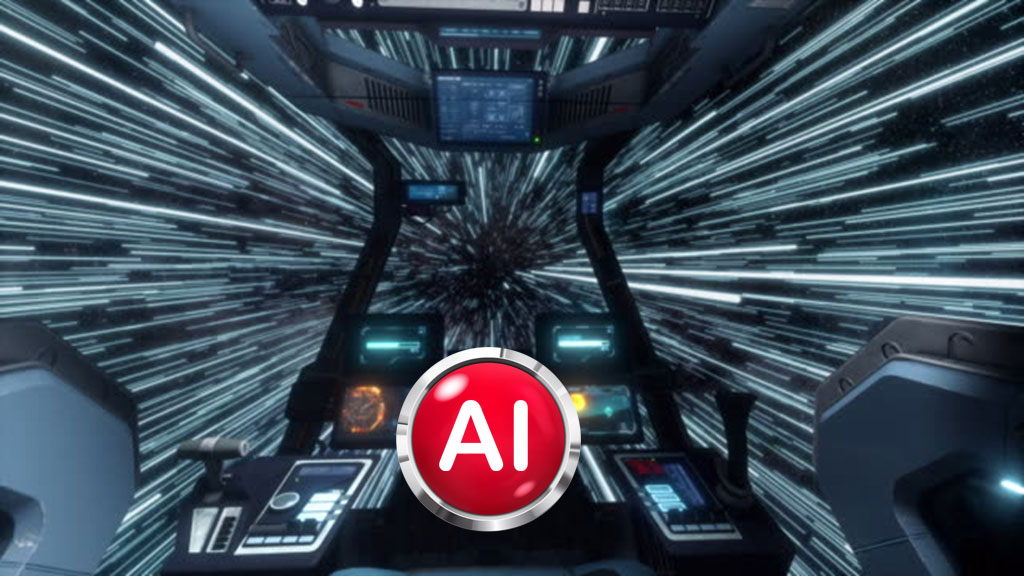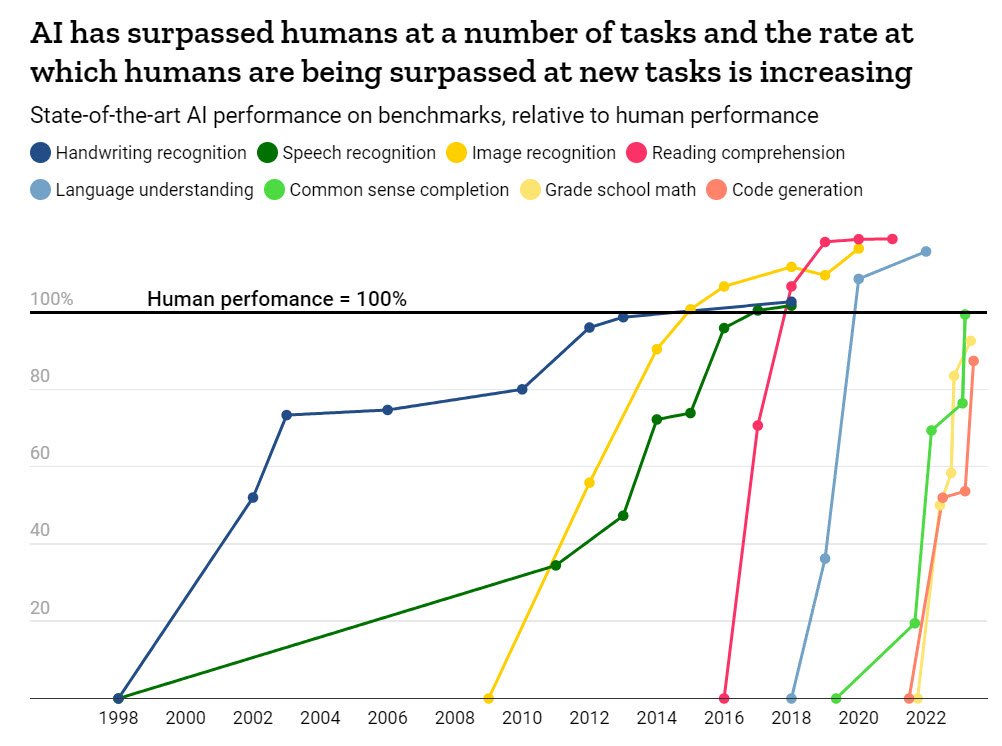
AI is going to change things that you use every day. The changes will be profound, perhaps more fundamentally important than the internet or the computer or the iPhone. The speed at which things change will be faster than anything you’ve ever lived through before.
You don’t believe me. That’s okay, I’m used to that. But also, I understand. AI gets a lot of attention but so far you’ve been able to ignore it – maybe you’ve dabbled but you don’t understand all the fuss.
Buckle up. By the end of this year and especially in 2025, your head will be swimming. Well, more accurately, drowning, while you paddle frantically trying to stay above water.
Once we get used to our technology, it’s hard when something changes. It was wrenching for many people when Microsoft replaced the menus in the Office programs with a ribbon. It’s maddening when a much-loved program is discontinued, or today when an Outlook user toggles the switch and sees the “new Outlook” (which is truly terrible in its current state, don’t do that). You might be frustrated by constantly shifting buttons in your phone apps, or defaults that are reset behind your back, or the ever-increasing ads and subscriptions that get in the way of doing things that used to be easy.
The changes that come along with AI are starting small – a new button on the Windows taskbar, a few extra lines at the top of Google searches.
Over the next 12 months, the tempo will increase, the changes will happen more rapidly, and new services will arise built on AI – unavoidable, overwhelming, and constantly shifting. Without quite knowing how it happened, you’ll realize Mr. Sulu has pushed the world to warp factor 9 and the stars are elongating from the speed of change.
Here’s a short history lesson, some info about where things stand today, and quotes from people smarter than I am about where we’re going. This will be very brief – follow the links to start your dive down the rabbit hole.
The history of tech revolutions
Do you remember the world before the internet? The world changed as we figured out what to do with instantaneous worldwide communication and access to information. Before the mid-1990s, secretaries took dictation, we went to the library to do research, and our entertainment options were limited to twelve TV channels and nearby movie theaters. None of those things changed overnight, but they all changed.
Personal computers started as devices for enthusiasts, then evolved into fundamental household devices used by nearly everyone. They continue to be our primary productivity tools but consumers shifted much of their attention to mobile devices after the introduction of the iPhone in 2007.
The transition to mobile devices did not happen overnight. Technology revolutions take time. It took five years or so for us to become dependent on iPhones as we learned the advantages of immediate 24/7 access to information that previously had been limited to computers.
Each tech revolution has a common feature: brand new ways to handle the world come into being that are unpredictable. They only appear inevitable in hindsight.
Think about the most recent shift to mobile devices. Random examples: Google Maps became the default way to handle navigation, now that we had a device tracking our location in our pockets. Today Uber seems like a natural evolution for traveling around cities, but nobody other than science fiction writers saw it coming. Social networks and ubiquitous photos changed our personal relationships.
AI is going to have that kind of impact.
Here’s an article about the bigger picture. It draws from a book by Carlotta Perez which argues that there have been five technological revolutions in the last 250 years, each of which can be assigned a starting “big bang” date: the Industrial Revolution (1771), steam and railways (1829), steel/electricity/heavy engineering (1875), oil/automobiles/mass production (1908), and information/computing/telecommunications.
Perez suggests that the big bang event for the modern era was the introduction of the first Intel microprocessor in 1971. The tech industry went through a typical cyclical crash in 2001 and is now in its mature phase.
Revolutions at roughly fifty year intervals. AI is right on schedule. The release of ChatGPT in 2022 was arguably the big bang event for the next technology revolution.
Why does it seem so quiet?
Hundreds of billions of dollars are being spent very quickly on the behind-the-scenes plumbing required for AI.
Microsoft, Meta, Alphabet/Google, Amazon, and China are all racing to expand their data centers. Nvidia’s lead in chips optimized for AI has catapulted it to become the third largest company in the world. Saudi Arabia intends to become a global tech superpower and has created a $40 billion fund to get started. It recently hosted a conference with over 200,000 attendees (200,000!) including executives from all the major world AI players, where more than $10 billion in deals were put together.
Meanwhile companies large and small are pouring money and energy into developing apps that use AI. The current chatbots are the merest shadowy glimpses of what lies ahead. Later this year the flood of apps and products and services will begin in earnest.
At first we will see extensions of the apps we use today. Microsoft is building AI into all of its products – literally every one. If you’ve noticed an icon for “Copilot” bouncing around your Windows taskbar, it’s an early AI chatbot that is just one of hundreds of Microsoft projects now under development. Word will add AI writing assistants, Microsoft Teams will search and summarize corporate data, Windows will do something with AI but no one can quite figure out what it is yet.
Adobe is adding AI generative features to Photoshop. Google is adding panels to Gmail using AI to compose messages for you. Everyone is trying to figure out how AI can improve their products.
But remember two things: (1) Technology revolutions take time. Companies and developers are working at a breakneck pace to develop those extensions and apps and products; we’re in the lull while their work happens behind the scenes. (2) This quiet period will be shorter than any comparable tech revolution before it. Things will start soon and happen fast.
What’s coming?

The above chart from Time Magazine compares AI and human performance in a number of areas. Basically, AIs can now do many tasks better than humans, and will rapidly surpass people in several more almost immediately. (Click on the link for context and information on sources.)
The list is daunting. AI can do these things as well as humans today, right now: handwriting recognition, speech recognition, image recognition, reading comprehension, language understanding, common sense completion, grade school math, and code generation.
What you see in the chart is not the end of the line. AI progress is speeding up.
At the moment humans still prefer human creativity, judgment, and morality.
Will that still be true in a year? Stay tuned.
There will be dozens, hundreds, thousands of apps during the next few years that claim to use AI. Some of it will be nonsense seeking to cash in on hype. There will not be an easy way to sort out the signal from the noise.
Don’t let your cynicism keep you from recognizing the real progress that will change our world. AI-driven computer power will be able to create, synthesize, design, sing, teach, diagnose, and much more. Here’s a roundup of fields that will be among the first to feel the effects of AI, including healthcare, finance, transportation, law, entertainment.
That’s the low-hanging fruit. Remember that the important part of the revolution will happen in ways that are unpredictable.
The leaders of giant tech companies will profit from building the infrastructure. It’s in their best interests to hype the importance of AI. Even with a grain of salt, though, it’s interesting to hear Nvidia CEO Jensen Huang state flatly, “Generative AI is the single most significant platform transition in computing history.” Microsoft CEO Satya Nadella is forcing AI into every corner of Microsoft’s products: “It’s a radical shift in the core workflow inside Microsoft and how we evangelize our output—and how it changes every school, every organization, every household.” Alphabet/Google CEO Sundar Pichai says, “AI is one of the most profound technologies we will ever work on.” Brad Gerstner, well-known investor and CEO of Altimeter: “AI is going to be bigger than the internet, bigger than mobile and bigger than cloud software,”
One of the first things you will see is a new generation of computers – both PCs and Macs – that have additional chips optimized for AI. The first ones have already been announced, with confusing new vocabulary (“Now with NPUs!” the ads will scream). As of today, there is literally nothing important that can use that new processing power. Will it be more obvious in six months? Should you buy a new laptop to future-proof your computing power?
No one knows. And yet you’ll feel pressured to make choices before the end of the year.
TechCrunch quotes Ilan Rabinovich, SVP of product and community at Datadog, talking about the similarities between what we’re seeing now and the early days of the internet.
“I feel like we’re like at that moment where the internet was just born, and they’re like, we have a network of interconnected machines, and we’ll share data, but what does that mean? Did we think that Amazon was going to be shipping me same-day boxes based on me clicking a button on a website? Probably not. And so now we have all of these industries that only exist because of the internet.”
At a US Senate Judiciary Committee hearing in December, Dario Amodei, CEO of prominent AI company Anthropic, said that “the single most important thing to understand about AI is how fast it is moving.”
Brace yourself.
